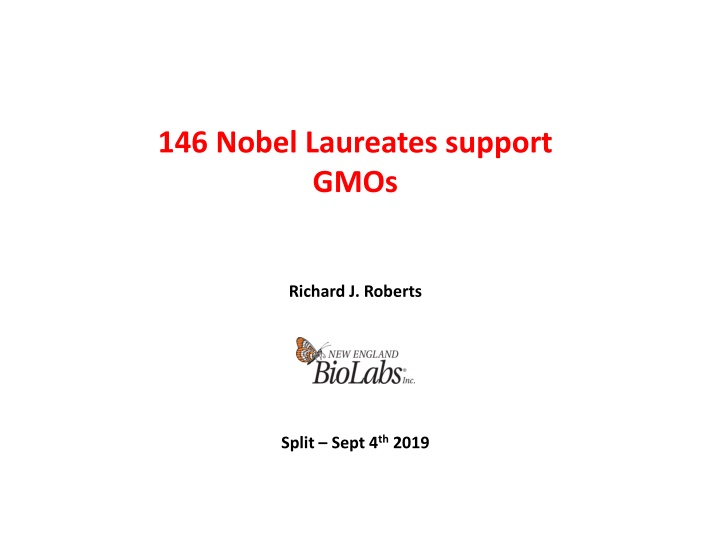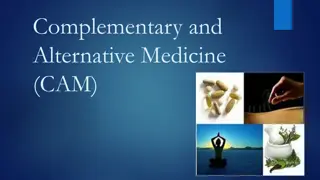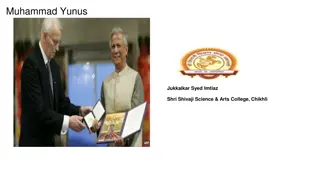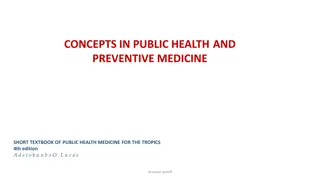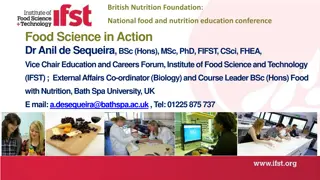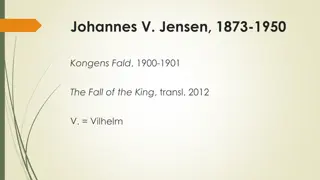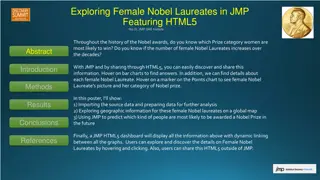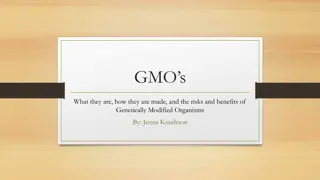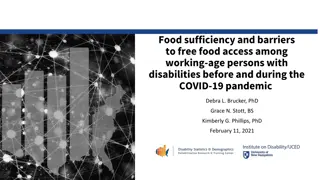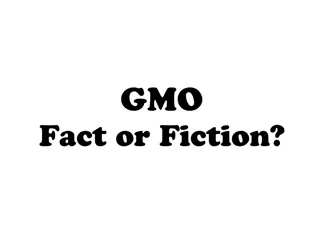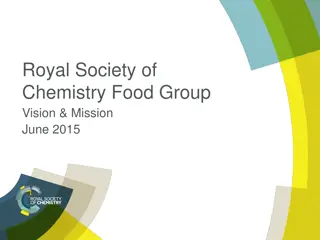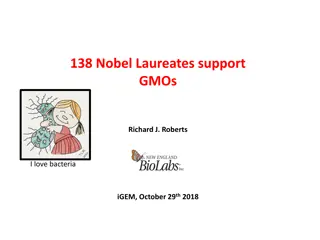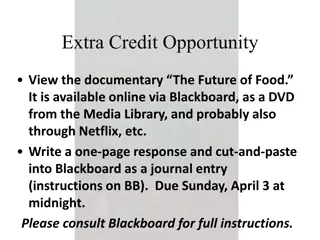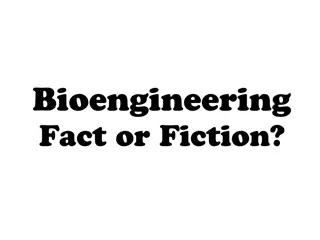Nobel Laureates' Support for GMOs and Food as Medicine
The article highlights the support of 146 Nobel Laureates for GMO technology, emphasizing its safety and importance for addressing world hunger. It also discusses the role of food as medicine and the need for promoting science honesty regarding GMOs. The message calls for the encouragement of GMOs for better yielding crops with added nutritional value, particularly in the developing world. Images and quotes related to GMO technology and agricultural advancements are included, showcasing the benefits and safety of these innovations.
Download Presentation

Please find below an Image/Link to download the presentation.
The content on the website is provided AS IS for your information and personal use only. It may not be sold, licensed, or shared on other websites without obtaining consent from the author.If you encounter any issues during the download, it is possible that the publisher has removed the file from their server.
You are allowed to download the files provided on this website for personal or commercial use, subject to the condition that they are used lawfully. All files are the property of their respective owners.
The content on the website is provided AS IS for your information and personal use only. It may not be sold, licensed, or shared on other websites without obtaining consent from the author.
E N D
Presentation Transcript
146 Nobel Laureates support GMOs Richard J. Roberts Split Sept 4th 2019
Marc Van Montagu and Jeff Schell Discoverers of Ti plasmid transformation together with Mary Dell Chilton
Remember that for the 800 million who go to bed hungry at night FOOD is MEDICINE
Nobel Laureates call for science honesty about GMOs Conceived in December, 2013 Planned during 2014-2015 Formal organization begun in July, 2015 Launched June 30th, 2016 We call on the Green parties to stop scaring the public by pretending that GMO foods must be banned because they are dangerous.
146 Nobel Laureates are urging everyone to acknowledge that GMO technology is basically safe and should be supported and encouraged for the sake of the developing world, who desperately need better yielding crops with added nutritional value. https://supportprecisionagriculture.org/
Food means Agriculture For 10-12,000 years we had been using crude genetics But in the 1980 s we learned how to be precise
Modern corn In our supermarkets Teosinte the wild ancestor GM by man GM by Nature
This is dangerous! Greenpeace says This is safe!
Traditional versus precision methods I want to move a GPS system from my old car into my new one Should I disassemble two cars, mix up the parts and then select for the one with the GPS, ignoring what else it might have picked up? Or should I take the GPS from one car and move it to the other?
Traditional versus precision methods If I take a GPS from an airplane will the new car fly?
Genetic Modification refers to a method But what is important is the PRODUCT not the METHOD This is just as true for traditional breeding
Plants cant run away from predators So how do they protect themselves? With pesticides!
Many common vegetables have high levels of natural pesticides. + 11 more
Food in Developing Countries Africa, S. America, Asia need better crops with higher yields. They need the products of precision breeding Europe doesn t YET! So why doesn t Europe endorse this? Could it be politics, or money or both?
The Real Problem Europeans did not want US companies to control their food How can that be prevented? Ban Monsanto and the other big US agribusinesses Not so fast - the farmers buy their seeds from them
The Green Parties Solution Assert that precision breeding might be dangerous! The politicians and the green parties will protect you from this risk by banning growing GMOs Best of all This has no economic consequence for Europe !
The tragic consequences Not content with blocking precision agriculture in Europe many politicians and NGOs like Greenpeace and Friends of the Earth are now spreading their message to the developing countries
The sad consequences in Africa The agricultural ministers want GM crops The farmers want GM crops The citizens want better, cheaper, nutritious foods But Trade Ministers don t want to lose trade with Europe The result a win for the anti-GMO activists
A case study Vitamin A-deficiency Global population mortality (in millions) Vitamin A-deficiency 1.9-2.7 HIV/Aids 1.7 Tuberculosis 1.4 Malaria 0.75 *Courtesy of Ingo Potrykus
Golden Rice A new source of Vitamin A Ingo Potrykus, ETH Zurich Peter Beyer, U. Freiburg Introduce the genes for -carotene into rice Courtesy of Ingo Potrykus
Golden Rice Became a reality in February, 1999. Could have been in the field within 2-5 years, beginning to save children from blindness and death. But it s a GMOand only now will it soon be available in Bangladesh. Why? Multiple years of delay due to regulation and opposition. Courtesy of Ingo Potrykus
The Banana Problem Xanthomonas wilt No natural varieties are resistant so no traditional breeding solution BUT Sweet pepper is resistant to Xanthomonas campestris and two genes are known that mediate this resistance. Using precision techniques these genes have been transferred to banana and these modified bananas are now beginning field trials.
Bangladesh: Bt eggplant Slide courtesy of Arif Hossain/Cornell Alliance for Science
Hawaiian papayas Almost a disaster
GMO Papaya saves the Hawaiian crop In the 1990s, Hawaiian papaya trees were plagued by the ringspot virus which decimated half the crop in the state. In 1998, Dennis Gonsalves from the University of Hawaii developed a transgenic fruit called Rainbow papaya, which is resistant to the virus. Now 77 percent of the crop grown in Hawaii is genetically engineered and being eaten in the USA. But in Thailand this solution is banned
Food choice is a luxury of the developed world If you don t want to eat foods derived by GM techniques, then don t. It s your choice But don t pretend such foods are dangerous And remember if anything They are probably safer than traditional foods
Science Facts For developed countries food is not a problem. We must never forget the consequences of our actions for the developing countries We need more science in politics And less politics in science
Actions needed around the world Politicians should listen to the scientists they fund Stop supporting the idea that foods produced by precision breeding methods must be inherently more dangerous than traditional methods, when science shows they are not
Civil Society must play its role too The major religious leaders should speak out Groups such as the Rotary Clubs should speak out Influential celebrities should speak out The media should present science facts not science fiction
CONGREGATION FOR DIVINE WORSHIP AND THE DISCIPLINE OF THE SACRAMENTS Prot. N. 320/17 Circular letter to Bishops on the bread and wine for the Eucharist . . . . 5. The same Congregation also decided that Eucharistic matter made with genetically modified organisms can be considered valid matter (cf. Letter to the Prefect of the Congregation for Divine Worship and the Discipline of the Sacraments, 9 December 2013, Prot. N. 89/78 44897).
News from Ghana: The former leader of the Peasant Farmers Association, Ghana s primary anti- GMO farmers group, has switched sides to adopt a pro-GMO position. Mohammed Adams Nasiru attributed his shift to receiving accurate information on agricultural biotechnology from the scientific community.
Have a heart Non-GMO is a Western indulgence of the rich It doesn t work for the poor in Africa https://supportprecisionagriculture.org/
